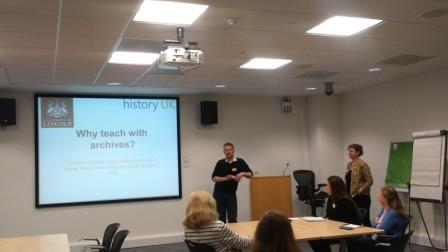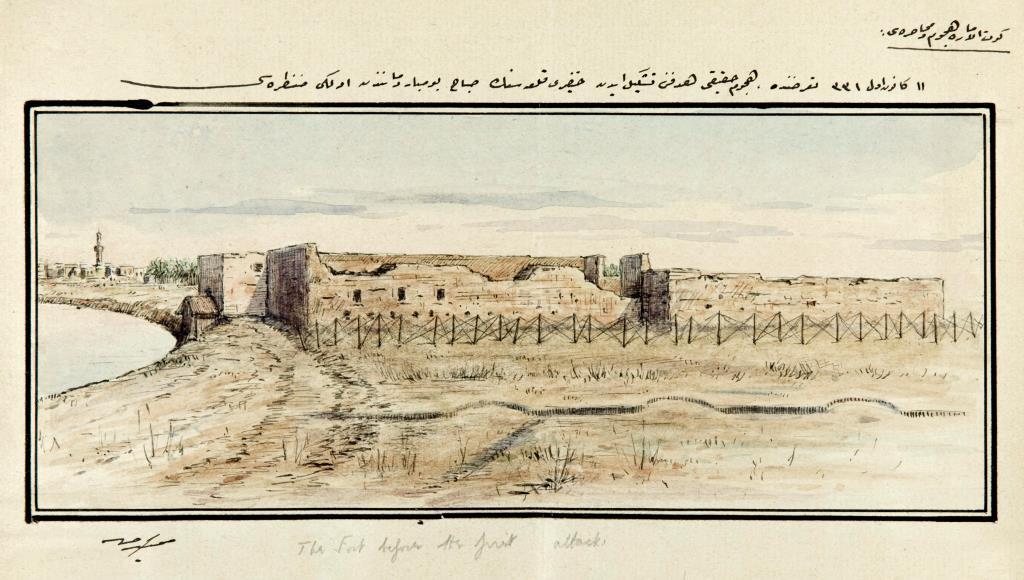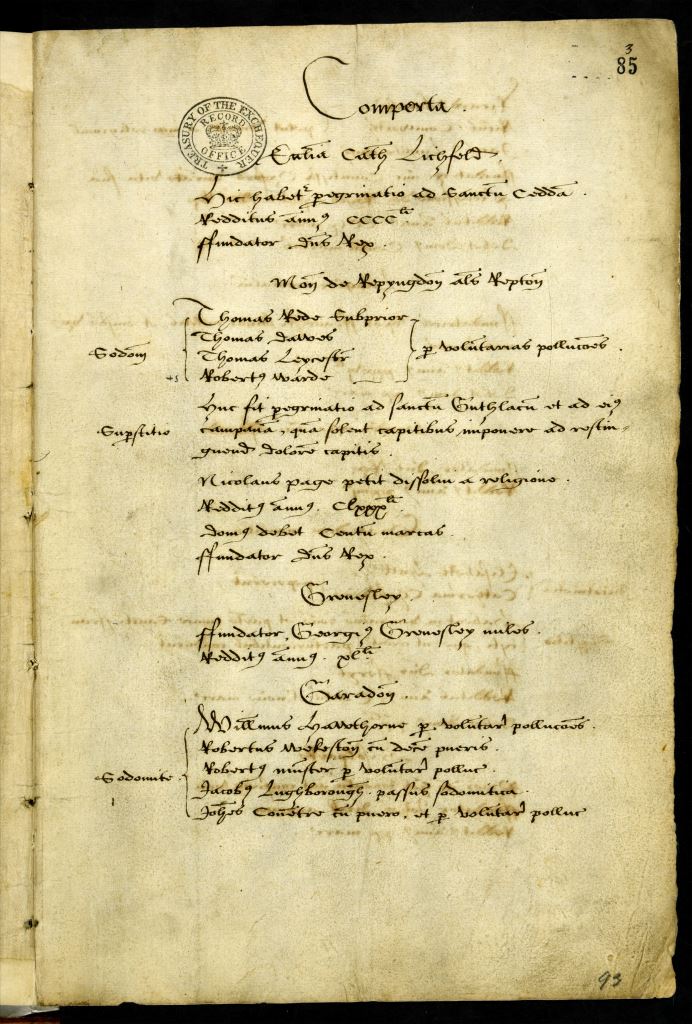
Jamie Wood and Christine Grandy began the workshop with a session on ‘Why teach with archives?’
Integrating document-based learning into higher education teaching is an excellent way to bring any subject to life. It shows students how our understanding of, for example, historical topics, is shaped by both contemporary and retrospectively created primary sources.
Academics, archivists and record specialists aim to be proficient at using archival material as part of their teaching and research, but it is not often that they have the opportunity to come together and share their expertise with those who are just getting started.
This was the focus of a professional development workshop that was held at The National Archives on 25 February 2017. It was designed to explore the benefits and challenges of using documents, objects and digitised sources in higher education teaching. The ultimate aim was to inspire the participants to think about ways of embedding archival materials more fully in their teaching.
The day began with a session on ‘Why Teach With Archives’, led by Jamie Wood (University of Lincoln and History UK) and Christine Grandy (University of Lincoln), in which they talked participants through two projects.
The first project, which Jamie helped to develop, involved engaging with the Lincolnshire County Archives as part of a second year Roman history module; students worked on research projects on Roman-era objects from excavations in Lincoln and Lincolnshire. The second project has involved partnership working with the Media Archive for Central England on a number of modules.
Jamie and Christine identified a number of positive benefits of their projects, including engaging students directly in archival research from an early stage of their university careers, an experience that should help to prepare them for more detailed primary source work at later stages. But there were also challenges; often these centred on the extent to which engagement with the archives can be supported throughout the curriculum rather than in isolated pockets.
Future work at Lincoln will focus on how archival training can be embedded more thoroughly across the undergraduate and postgraduate curriculum.

Sketch produced by an Ottoman officer during the siege of Kut (catalogue reference: TNA CAB 44/36 f. 2)
In the second session, a ‘Document investigation’ exercise, the workshop organisers Laura Tompkins and Richard Dunley from The National Archives had participants working in groups. They were presented with a selection of unusual ‘mystery’ documents or objects from The National Archives’ collections that they had not previously seen.
The document shown to one group of participants was a sketch (shown above) accompanied by writing in Arabic script. They were asked to put themselves in the shoes of their students and write down what questions they would pose of the document. This threw up a number of issues, mostly focused around who drew the sketch, for what purpose, and how did it end up in The National Archives? The participants were then asked to apply their skills as archival researchers to see what more they could uncover. By using catalogues and navigating the structure and hierarchy of the archives, they managed to make sense of the documents in a way they had not been able to previously, reinforcing the importance of the learned skills embedded in ‘expert practice’.
The document shown above is from CAB 44/36; it is a sketch bound up in a journal produced by an Ottoman officer during the siege of Kut. It has ended up as part of The National Archives’ collections owing to its collection by the Committee of Imperial Defence, Historical Branch, in order to help them understand the events of the First World War from both sides, and so learn lessons from the conflict. This exercise was a really useful way of getting experienced researchers to engage with the archives as if they were starting out again. It proved the value of outlining systematically to students (or getting students to do so for themselves) the series of questions that we should ask of new materials.
Lisa Smith, Lecturer in Digital History at the University of Essex, started off the second half of the day. Her session explored the ways in which digital archives and methods can serve as useful proxies for archival training and in the process can develop students’ research skills. One particular research endeavour that Lisa shared was the Early Modern Recipes Online Collective. As part of this project, in annual ‘transcribathons’ students of all abilities participate in the collective transcribing of early modern recipe texts from digital manuscript images, building confidence in the skill of reading old handwriting and encouraging engagement with manuscripts through a different medium. It was pointed out that the use of digital methods and digitised archives may be an appropriate means of meeting some of the challenges of embedding archival training more fully, as identified earlier in the day.
The final session investigated how to get started on a practical level and incorporate archival material as part of higher education teaching, led by Anna McNally (The University of Westminster Archives) and Marianne Wilson (The National Archives). The importance of developing clear learning objectives for using archives in teaching and also the significance of teaching students how to use archives successfully was highlighted – it is a skill to navigate catalogues and digital repositories successfully, using the correct vocabulary and then to select and interpret appropriate material. Part of this activity involved exploring how different sources from The National Archives’ collections could be used for teaching purposes, for a session on ‘Gay and Lesbian History in the Archive’, and what potential issues different types of source presented. This can be a challenging area to research, as it is an area of study that is still in its infancy and many sources might not be immediately obvious.

First folio of the ‘Compendium Compertorum’: TNA SP 1/102, f. 85
One of the groups worked with a Latin source from the 16th century. The ‘Compendium Compertorum’ is a record of the Royal Visitation of the monasteries between 1535 and 1536, prior to their dissolution. Commissioners identified alleged crimes committed by individual monks, canons and nuns. Monastic historians have previously been shocked by the prevalence of accusations of sodomy in this document. But it seems that the Commissioners might have been trying to paint a particularly negative picture of the monasteries, by increasing the incidence of sodomy in the records for propaganda effect, to strengthen their argument for dissolution. This document provoked discussion about the importance of placing documents into their historical context, ways in which evidence can be manipulated, how to break down barriers and concerns related to working with pre-modern Latin documents and also how diverse histories can be explored through a variety of different records.
The importance of partnership working was pointed out throughout the day. Archivists have a key role to play in providing guidance to higher education professionals in the use of archival material for teaching, while university lecturers have the pedagogic expertise to enable creative and fulfilling engagement of students with primary historical documentary evidence.
Overall this was a successful session that The National Archives will seek to develop and run again, in collaboration with archivists from other institutions and higher education professionals, to share knowledge and best practice with those who teach students at University level about the benefits of working with documentary sources for learners of all abilities.

[personal information removed]
Hello,
When is the next planned session on using archives in education/teaching please?
The session last April 2017 reads very well,…something similar and including education before higher education, would be very useful to teachers in primary and secondary schools.
Thank you